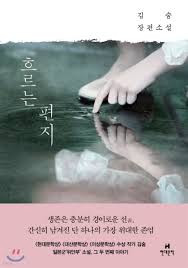
Flowing Letters (흐르는 편지 )
Soom Kim
2018
In her second novel on the subject of Korean comfort women, award-winning author Soom Kim presents a haunting first-person account of a 15-year-old girl imprisoned in a military brothel during Japan’s occupation of Korea. Set entirely within the confines of a comfort station, the novel illustrates the inner world of a young victim whose life has been derailed by war and exploitation. Rather than avoiding the harrowing details of captivity, it instead offers a deeply empathetic rendering of pain, memory, and the fragile endurance of humanity in inhuman conditions.
Unlike her earlier novel, which focused on the present-day reality of surviving victims, this book focuses on the moment of trauma itself. Built from years of research, survivor testimony, and emotional reflection, the novel became possible only after the author felt she had fully internalized the material. Through lyrical prose and harrowing intimacy, Kim gives voice to a girl stripped of her future, capturing not only her suffering but the enduring dignity she clings to in silence. The novel serves as both a reckoning and a memorial, testifying to lives often forgotten and offering a searing reminder of the personal costs of history.
Korean translation of the summary:
한국군 위안부 문제를 다룬 김숨 작가의 두 번째 장편소설 “흐르는 편지”는, 일제강점기 위안소에 감금된 열다섯 살 소녀의 삶을 1인칭 시점으로 그린 깊이 있는 작품이다. 이야기의 배경은 철저히 위안소 내부로 제한되며, 전쟁과 착취로 인해 삶의 궤도가 뒤틀린 한 소녀의 내면 세계가 섬세하게 펼쳐진다. 작가는 피해의 고통스러운 세부를 회피하지 않고, 오히려 비인간적인 조건 속에서도 인간다움을 지키려는 주인공의 기억, 아픔, 그리고 연약하지만 강인한 생존을 깊은 공감으로 담아낸다.
작가의 전작 『한 명』이 현재를 살아가는 생존자들의 삶을 조명했다면, “흐르는 편지”는 그 고통의 순간 자체를 응시한다. 수년간의 자료 조사와 생존자들의 증언, 그리고 작가 자신의 정서적 체화를 통해 쓰인 이 작품은 단순한 소설이 아닌 역사적 증언이자 정서적 진혼곡이다. 시적이고 응축된 문장 속에서 김숨은 미래를 빼앗긴 한 소녀의 목소리를 들려주며, 그 침묵 속에서도 꺾이지 않는 존엄을 포착한다. 이 소설은 망각된 생들의 증언이자, 역사의 개인적 대가를 상기시키는 치열한 기록이자 추모이다.
About the Author:
Soom Kim is a South Korean novelist acclaimed for her unflinching literary portrayals of historical trauma, particularly those involving marginalized voices in Korean history. She studied creative writing at the Seoul Institute of the Arts and began publishing fiction in the late 1990s. Her 2016 novel One Left was the first Korean novel to focus solely on the life of a former comfort woman, was based on extensive research and survivor testimonies, including those archived by the Korean Council for Justice and Remembrance. Kim explores memory, silence, and the ethics of witness, cementing her rep
